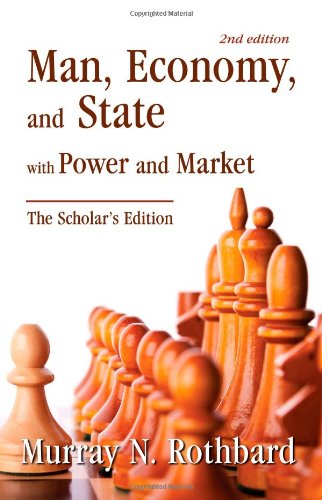NB: All previous chapters can be found here.
On Mises’s Ethical Relativism, by Murray Rothbard
As the purpose of this book is to search for liberty, sooner or later I would come to this point: bringing the natural law framework and libertarianism together. There is no libertarian thinker of which I am aware that has made a stronger and more complete statement on this matter than Murray Rothbard.
I will use this essay from Rothbard not for the purpose of a compare-and-contrast with Mises, but because in this essay Rothbard makes strong statements about his own views on the matter of ethics and the connection of ethical values to liberty. In subsequent chapters, we will explore the whats and hows of Rothbard’s views and therefore his views regarding natural law. But before getting to this, an understanding of his position on ethics is necessary.
 Man, Economy, and Stat...
Best Price: $23.43
Buy New $29.95
(as of 08:10 UTC - Details)
Man, Economy, and Stat...
Best Price: $23.43
Buy New $29.95
(as of 08:10 UTC - Details)
This will be a very short chapter. It may also be the most important chapter in the book.
Rothbard opens by contrasting what he means by absolutism as opposed to relativism on this topic of ethics:
The absolutist believes that man’s mind, employing reason (which according to some absolutists is divinely inspired, according to others is given by nature), is capable of discovering and knowing truth: including the truth about reality, and the truth about what is best for man and best for himself as an individual.
I could probably stop here; from this statement, two points are clear: first, that there is an objective truth regarding humans and for humans, and second, that it is to be discovered by humans, not created by humans. But I won’t stop here; his statements grow ever stronger and more relevant.
Philosophically, I believe that libertarianism — and the wider creed of sound individualism of which libertarianism is a part — must rest on absolutism and deny relativism.
It is worth noting: Rothbard is clear that – unlike in economics, for example – when it comes to ethics, there is an absolute, objective standard. Not all values are subjective. Rothbard offers strong – even forceful – criticisms of the idea of relativism in ethics.
What I have been trying to say is that Mises’s utilitarian, relativist approach to ethics is not nearly enough to establish a full case for liberty. It must be supplemented by an absolutist ethic — an ethic of liberty, as well as of other values needed for the health and development of the individual — grounded on natural law, i.e., discovery of the laws of man’s nature. Failure to recognize this is the greatest flaw in Mises’s philosophical worldview. (Emphasis added.)
Rothbard clearly understands that a “full case for liberty” can only be made on a foundation of values built on natural law – and that natural law is to be discovered, not created. To emphasize this point, Rothbard identifies himself as one who…
…[accepts] both praxeological and ethical absolutism, and [recognizes] that both are vitally necessary for a complete philosophical view, as well as for the achievement of liberty.
Conclusion
“Anything peaceful” and property rights as the highest value might exemplify thin libertarianism, but libertarianism is not sufficient for liberty.
Reprinted with permission from Bionic Mosquito.





